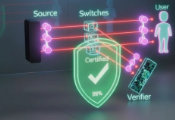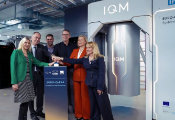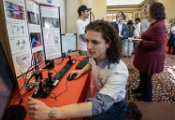Rigetti Wins Innovate UK’s Quantum Missions Pilot Competition to Advance Quantum Error Correction Capabilities on Superconducting Quantum Computers
BERKELEY, Calif., April 22, 2025 -- Rigetti UK Limited, a wholly owned subsidiary of Rigetti Computing, Inc. (“Rigetti” or the “Company”), a pioneer in full-stack quantum-classical computing, today announced that it has been selected as one of the winners of Innovate UK’s Quantum Missions pilot competition to benchmark and enhance quantum error correction (QEC) capabilities on superconducting quantum computers. Rigetti will lead a £3.5 million consortium alongside Riverlane and the NQCC Superconducting Circuits Team to leverage Rigetti’s superconducting quantum computer hosted at the NQCC to conduct ambitious QEC tests that advance state-of-the-art metrics and demonstrate real-time QEC capabilities — a requirement for universal, fault-tolerant quantum computing.
Fault-tolerant quantum computing has the potential to usher in a new era of computational power to solve real-world problems. Achieving fault tolerance requires QEC to be effectively integrated with quantum computing technology, and with that comes addressing critical challenges. These include processing bottlenecks in classical control systems and their integration with quantum error decoding technology, as well as the high error rates of current quantum computers. The project aims to make measurable advancements towards overcoming these challenges by developing key capabilities required for executing a large number of quantum operations on Rigetti’s UK-based quantum computer.
As part of the project, Rigetti will upgrade its existing NQCC quantum computer. The upgrades will include:
- Deploying a larger 36-qubit quantum processing unit (QPU), updating from the current 24-qubit QPU
- Integrating Rigetti’s latest generation control system, enabling improved qubit control and a fully programmable, low-latency interface with Riverlane’s Quantum Error Correction (QEC) Stack
Riverlane will lead the QEC experiments, identifying key improvements to enhance system performance and meet crucial QEC metrics. The NQCC Superconducting Circuits Team will support the system upgrade and provide quality assurance for the QEC experiments.
“Our NQCC testbed continues to serve as a critical resource for advancing our technology capabilities. We believe that we have a tremendous advantage on our path to fault-tolerant quantum computing with Riverlane’s QEC expertise and our modular, open architecture that lends itself to flexible and innovative solutions to scale our technology,” says Dr. Subodh Kulkarni, Rigetti CEO. “Moreover, we benefit from the strong advantages of superconducting qubits, which we believe are the winning qubit modality given their fast gate speeds and clear path to scaling.”
“Developing high-performance quantum error correction is critical to achieving fault-tolerant quantum computing, and this project provides an ideal environment to advance those capabilities,” said Steve Brierley, Riverlane CEO & Founder. “By integrating our QEC stack with Rigetti’s upgraded superconducting quantum computer, we aim to achieve measurable improvements in key performance metrics, including throughput, latency, and decoding accuracy, which are essential for real-time error correction. We look forward to making significant progress through this collaboration.”
The Quantum Missions pilot competition was established to accelerate quantum computing and quantum networking projects by increasing their capabilities and removing technological barriers to their commercialization and adoption. Rigetti was also awarded two additional Quantum Missions pilot competition projects:
- Collaboration with SEEQC to integrate its digital chip-based technology with Rigetti’s 9-qubit Novera QPU hosted at the NQCC with the goal of identifying and understanding the key system components needed for scalable QEC. The project partners also include Cambridge Consultants, Oxford Instruments Nanotechnology Tools, NQCC, and University of Edinburgh.
- Collaboration with TreQ, Qruise, Q-CTRL, and Oxford Ionics to create an open-architecture quantum computing testbed. The project will offer eight unique configurations by combining two quantum processors, two control systems, and two quantum software stacks. The project will also deliver an open specification for quantum workflows, creating a common interface between quantum software and hardware.
These projects build on Rigetti’s leadership in the UK’s quantum computing ecosystem, including launching the first fully operational quantum computer at the NQCC and leading a three-year £10 million consortium to deploy one of the first UK-based quantum computers hosted at Oxford Instruments’ Tubney Woods facility.




































